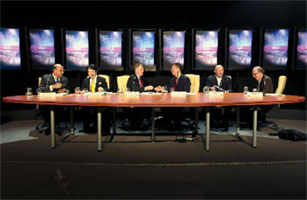
WORLD VIEW: TIME's panel of economists debated bailouts, recession and reform
Last year, the annual gathering of TIME's Board of Economists on the first day of the World Economic Forum in Davos was dominated by a debate over just how bad the then-gathering financial crisis would be, and whether the rest of the world would share in the economic comeuppance facing the U.S.
This Jan. 28, on a day when the lowering snow-filled skies matched the mood of those inside the Davos Congress Center, there was no such debate. In a packed room for what has become an opening-day tradition, everybody agreed with Morgan Stanley Asia chairman Stephen Roach's grim assessment that "this will most likely be the first year since the end of World War II when world GDP actually contracts." In fact, after Roach predicted 2.5% average global growth over the next three years — which still qualifies by most standards as a recession or close to it — Keio University economist and former Japanese Minister for Internal Affairs Heizo Takenaka quipped that Roach was being "much more optimistic than expected."
Depression or Recession?
Later on, Roach and Financial Times columnist Martin Wolf, who was in the audience, differed on whether we're in a "proto-depression" (Wolf) or a "global recession the likes of which we've never seen" (Roach). But that was more a linguistic debate than an economic one. There was also some disagreement over China's growth prospects. World Bank chief economist Justin Yifu Lin said he thought the country's big fiscal stimulus plans, including massive expenditure on infrastructure, would keep growth above 7% per year. No one else was that confident.
Still, it's fair to say there was a consensus on the current prospects of the global economy, and it was pretty gloomy. So the economists' discussion focused instead on what could be done to keep matters from getting much worse — and how to structure a global financial and economic architecture that's not quite so susceptible to breakdown. These are also major themes for the entire Davos conference this year, where chastened business leaders and government economic officials from much of the world are gathering to discuss how to rebuild broken systems, or, indeed, whether they ought just to start anew.
Trevor Manuel, South Africa's Minister of Finance, was among those who hoped for the latter. "We've lived through the era from 1944 to the present, and beyond this lies something different," he said. Manuel painted a dire picture of how the current crisis is affecting emerging markets. "I suppose the debate last year was about decoupling," he said, referring to the idea, briefly fashionable, that the high-growth economies of the developing world were establishing a self-sustaining growth, rather than relying on export markets in rich nations. "But now, looking at Africa, it's the risk of decoupling, derailment and abandonment together."
Turkish industrialist Ferit Sahenk, chairman of the Dogus Group, worries that those in the developing world who have borne the brunt of reform efforts may now turn against them, with social and political consequences that are potentially worrisome. He could imagine people saying, "We went through all these structural changes, all these reforms. We changed ourselves. Now why are we being punished?" It's already true that pain has been felt far from its origins. The crisis may have begun in the U.S. mortgage market, but that is by no means the only financial market that has frozen up. "Countries that have taken tough decisions of macroeconomic reform and then been able to access capital markets are now crowded out," Manuel said. "The markets are effectively closed."
The fiscal-stimulus programs and corporate bailouts now in vogue in developed economies are in some cases making things worse, Manuel argued, because they draw resources away from the developing world. "I think you'll end up with wealthy states heavily indebted and very little to show for it," he said. The World Bank's Lin countered that while "coordinated fiscal response" was a good idea, it wouldn't work unless it included some kind of mechanism to transfer resources from developed countries that can still borrow in global markets to developing ones that "don't have that fiscal space."
Sahenk spoke of how Turkey weathered a financial crisis in 2001 and 2002. Tough conditions imposed by the International Monetary Fund were part of the solution, he said, "but the main thing was that the country got together, all the stakeholders together, and stood together and supported it collectively. This is probably what we need in the grand picture in the world today: collective action."